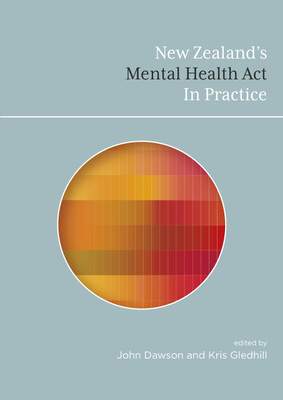Hide Description- Show Description+
The ability to make decisions and take actions that influence our life is critically important, and ranges from simple everyday choices about what to eat or wear, to far-reaching decisions about health care and personal or financial matters. When our ability to make our own decisions is impaired, whether due to dementia, learning or intellectual disability, mental illness or brain injury, that might mean we are not able to make decisions for ourselves. So, there is a need for clear assessment processes to help decide whethersomeone has the capacity to make their own decisions, who should make decisions on their behalf, and on what basis such decisions should be made. The guidance in this book has been written to serve the needs of doctors, lawyers, health practitioners, families and whānau. It is written by experts from a range of disciplines including law, medicine and ethics, and is based on the Toolkit for Assessing Capacity. It combines an explanation of the law, case studies and practical guidance for health and legal practitioners about capacity, how it is assessed, and what supporting people with impaired capacity means in practice.
Alison Douglass is a Dunedin barrister specialising in health and disability law. She represents people with impaired capacity and their families in the Family and appellate courts, including people subject to the main legislation in this field, the Protection of Personal and Property Rights Act 1988 (PPPR Act). Alison is the 2014 recipient of the New Zealand Law Foundation International Research Fellowship.
Dr Greg Young is a consultant psychiatrist at Capital Coast DHB. He is a clinical senior lecturer in the Department of Psychological Medicine, Wellington School of Medicine and an associate of the Bioethics Centre, University of Otago.
John McMillan is a Professor at the Bioethics Centre, University of Otago. He is Editor in Chief of the Journal of Medical Ethics and was a member of the working party that wrote the Nuffield Council on Bioethics report Dementia: Ethical Issues.
Contents
Foreword
Justice Susan Glazebrook, Judge Mary O’Dwyer and Professor Bruce Arroll
Acknowledgements
Authors and contributors
Introduction
PART ONE: KEY CONCEPTS AND LEGAL OVERVIEW
- 1. Capacity: Key Concepts
- 2. Capacity Law and the PPPR Act
Taking capacity seriously – England’s experience
Nuala Kane and Alex Ruck Keene
- 3. Capacity and Health Care
Fusion or confusion? Capacity and its role in involuntary
mental health legislation in light of international developments
Alex Ruck Keene
- 4. Supported Decision-making
Unconscious bias and clinical care
Angela Ballantyne and Chris Reid
Cultural diversity and the role of interpreters
Ben Gray
- 5. Mäori Perspectives
Joanne Baxter
Tikanga in law
Jacinta Ruru
PART TWO: CASE STUDIES IN PRACTICE
- 6. Consent to Health Care
Consent and refusal – support for legal capacity
Alex Ruck Keene
- 7. Liberty and Placement in Care
Is there a suitable framework for the deprivation of liberty
in New Zealand?
Mark Fisher
- 8. Financial Capacity
Assessing financial capacity: a clinical perspective
Jane Casey
- 9. Capacity and Personal Relationships
Capacity to marry: applying the Toolkit in practice
Kathryn Lellman
Assessing capacity to consent to sexual relationships: a psychologist’s perspective
Kay Cunningham
- 10. Capacity to Make a Will
Does the ‘Golden Rule’ apply in New Zealand?
Nicola Peart
Medical aspects of end-of-life testamentary capacity
Gary Cheung
- 11. Substance Addiction
Challenges for clinicians under the Substance Addiction
(Compulsory Assessment and Treatment) Act: two perspectives
Darren Malone and Katherine Shaw
Human rights and insight
Kate Diesfeld and Sarah Watts
Reflections on capacity under the Act, from a member of the Bench
Phil Recordon
- 12. Advance Decisions
Angus: Case Commentary
Ron Paterson
PART THREE: PROFESSIONAL GUIDANCE
- 13. Guidance for Health Practitioners
- 14. Guidance for Lawyers
APPENDICES
- A. A Toolkit for Assessing Capacity
- B. UN Convention on the Rights of Persons with Disabilities
- C. Guidelines for Counsel for Subject Person appointed under
the PPPR Act
- D. Practice Note: Applications under the PPPR Act
- E. Code of Conduct for Expert Witnesses
- F. Template Letter to a Health Professional Requesting a
Capacity Assessment
- G. Standard Explanation for EPOA – Property
- H. Standard Explanation for EPOA – Personal Care and Welfare
- I. Clinical Opinion of Capacity for EPOA – Property
- J. Clinical Opinion of Capacity for EPOA – Personal Care
and Welfare
- K. Certificate of Mental Incapacity for EPOA – Property
- L. Certificate of Mental Incapacity for EPOA – Personal Care
and Welfare
- M. Prescribed Information for Certificates of Mental Incapacity
- N. Report of Registered Medical Practitioner Form
Glossary
Bibliography
Table of statutes, regulations and international treaties
Table of cases
Index







